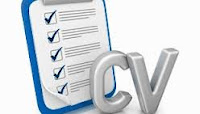How to Write the Perfect CV/Resume!
How to write a successful CV http://www.cvtips.com/

First, you need to know what companies think.
Fill a vacancy will take valuable time that the company prefers to go by his standard work.
The employer would find the right person instantly instead of plowing through hundreds of resumes for jobs in food manufacturing in the UK. It is often a tedious and thankless process.
The employer has a job description which includes the experience or skills for practical work and some features that are attractive but not absolutely necessary. food management jobs require many different skills.
They begin to go through the stack of resumes on your desk, then analyzes each for about 30 seconds to make a judgment. In addition, there may be many FMCG companies recruit for a moment in time.
In short, they are running out of time to read a resume that is more than two pages in which all the details hidden in long paragraphs. The CV is presented in the document.
Getting fancy shape, color text or unexposed many sources. This person is trying to hide their lack of practical experience to work behind an artistic program? - Classified in the trash.
Misspellings and poor punctuation! This person is careless! - Classified in the trash.
That should tell you a few things about writing your resume.
Keep it concise and to the point. The employer make your work experience, skills and triumphs in the first 30 seconds scanning your resume.
Keep it simple. Normal size, just introduced in the sections. The company wants to see exactly when, where and what you have done.
Striking application format makes reading difficult. You can make your resume stand out from the rest, but for the wrong reasons. For example food engineering requires technical experience let out from the norm.
Keep your English exam. Good spelling, punctuation and grammar are necessary. It is the first step in his personal demonstration of an employer. That says a lot about you. In addition, the employer turns bad English to study the content of your resume.
How to write a resume for every bag of food for work
A good resume has two objectives - to illustrate your strengths and maximize your chances of getting through the interview and to put factual information, such as dates, places, names together in a presentable and readable form.
Focal Point
He claims that human eyes are usually attracted a focal point one third down from the top of the page. Therefore, put your most beneficial information in this area.
It might be a profile, key skills, specialized skills or details of his latest work. You can choose what you think is most important and relevant to your application.
Always get a second view, when you put your CV. It is difficult to be objective about yourself.
Presentation
It is generally accepted that a resume should be two sides of A4 length. If you need to move to a third page to ensure that the program is spread over three full pages, not one and a half as messy.
As golden rule should be more white than black on a page to make it much easier to read.
constantly write a first draft. It can be as long as you want, how you can change it later. Always start your career history, and that will highlight your key skills and help you write your profile.
Once you have compiled your project should change.
1) Remove anything that will not help you get where you want to be.
2) Never use the past, for example, the tense use "supporting senior management" rather than "supported senior management".
3) Use short sentences cut any strong waffle and jargon.
Topics
Name
Type your name in bold type at the top center of your resume. If there is no doubt as to what its name, for example, Robert John, indicate by using capitals or underlining.
Street Address
Top left of CV, full address including postcode and telephone number.
Personal Details
Personal data should be limited to those that are absolutely vital. Most recruiters are waiting to see your nationality and date of birth, but can choose to leave these if you think you can go against you.
Other personal data, such as number of dependents, driving license and marital status can be integrated, if it will not make a request by including too long.
These can help companies get a global picture of the person to be interviewed. Do not include the names and ages of the children or spouse's name. The company is not interested at this stage.
Profile
This is an introductory statement about who you are and what you have to offer. You must complete this last although it is positioned prominently in the CV, possibly placing the focal point.
There must be more than two sentences and include the most important facts about you. Include experience, success, responsibility or personal characteristics.
'Food Production Manager highly trained with successful motivational skills and industry experience refrigerated foods.
Employment History
Always start with your most recent job. Analyze your work skills as much as possible. List the main achievements with lots of juicy details and figures, will impress and will be a topic of conversation through an interview. You must have more to say about his latest, and therefore most relevant, employment.
Include successes and triumphs especially if the money the company is registered.
Qualifications
Note should be defined in terms of selling themselves to the employer. Include all relevant courses, past dates and the name of school or college. But the qualities and the poor side failures. They will not help you invited for an interview.
If you have a college degree, you can set aside all their lower grades. Mature applicants may want to leave out "Education" completely since his history and career skills are probably more important.
Capacities
skills can be called in three sections: technical knowledge, professional courses and additional skills. Technical skills are those related to technical work, mechanical or engineering.
You need a list of your skills and how was recently used eg HACCP for food production jobs to apply for jobs in the power management in the UK. Vocational courses are those that you have specifically attended for a particular job.
Additional skills are another thing that can eg be relevant languages, keyboard skills, lean manufacturing.
Interests
Include only the interests that are unusual or which indicate transferable skills, achievements or responsibilities.
Use the following tips for writing a resume for employment Food Manufacturing.











